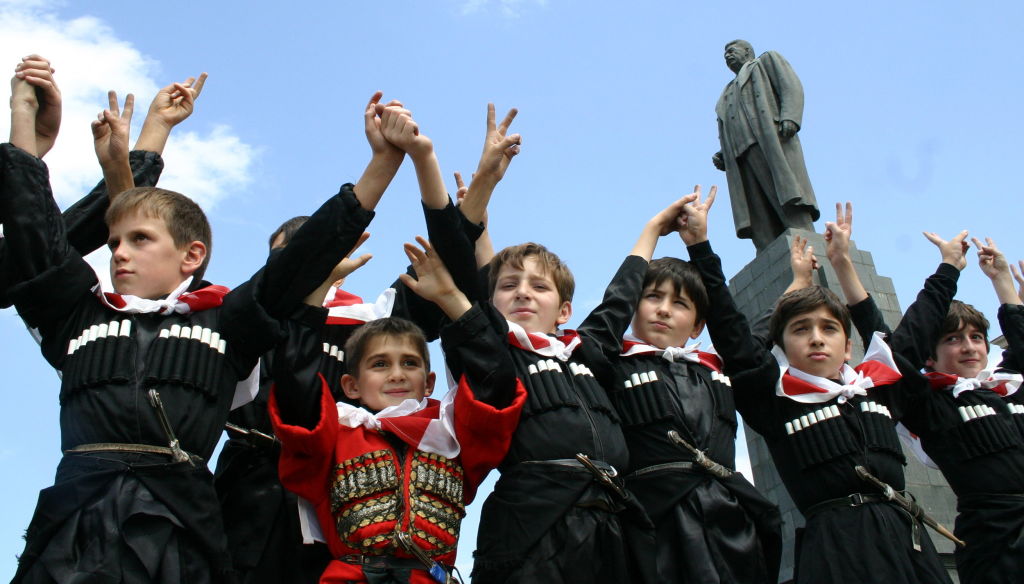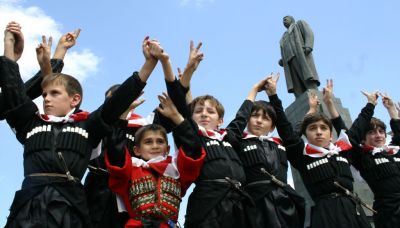TBILISI, Georgia—Imagine what would happen if tomorrow someone erected a statue of Adolf Hitler in Austria. No doubt the Austrian people, and millions of others around the globe, would demand the monument be torn down. But Austrian authorities would never be crazy enough to allow the construction of such a statue in the first place. Unfortunately, I can’t say the same of leaders in my country.
Like Austria, Georgia is also the birthplace of a genocidal 20th century dictator: Joseph Stalin. Unlike Austria, Georgia is increasingly embracing its homegrown despot. Eleven new statues of Stalin have been erected in the country in recent years, according to Irakli Khvadagiani of the Soviet Past Research Laboratory. These aren’t the result of a few eccentric people with outsize influence: Credible polling shows a dramatic improvement in the dictator’s image across Georgia.
How did this happen? Like any sociological phenomenon, it’s complicated. But the Russian government, using disinformation, successfully utilized Stalin’s Georgian origins to boost its long term project of constructing an anti-Western, nativist strait of Georgian nationalism to halt the country’s westward move.
For years, Russian President Vladimir Putin has made “protecting” the Soviet Union’s legacy a priority. While he has criticized the empire’s failings, he also has made an effort to sanitize some of the darker points in its history. Weaponized history has become an important tool in Putin’s foreign-policy—recall that the pretext for his invasion of Ukraine is based on a faulty historical account that rejects Ukrainian sovereignty—yet the West hasn’t been able to effectively counter the problem.
The modern Russian regime’s legitimacy is tied to a false history, particularly around World War II. The Soviet Union was, overall, a force for good. The idea that Hitler and Stalin were real allies is a fabrication. The Holodomor, a famine in Soviet Ukraine that killed millions, didn’t really take place, and portraying the famine as genocide is a Western conspiracy. Defeating this founding mythology—that is, having millions of people in the former Soviet Union reject these concepts—would inflict irreparable damage on the Putin regime’s domestic legitimacy.
But the West’s response has been underwhelming. Consider how America has approached the problem. Millions of U.S. tax dollars have gone toward countering Russian disinformation, particularly on social media. The lies are “debunked” or “fact-checked” in various forums—and often fake news warnings are attached to posts on social networks—while endless conferences and reports analyze the extent of Russian disinformation operations. Yet the strategy’s effectiveness is questionable at best, as Russia has had great success in getting to the hearts and minds of ordinary people through weaponization of Soviet totalitarian history.
What’s happening in my country today demonstrates that not dealing with Soviet crimes as the civilized world dealt with Nazi German crimes has been a present to Putin’s propaganda machine. The continuous emphasis on mapping and fact-checking as key focus of counter disinformation efforts allows Putin to keep this false but dangerous mythology alive.
As with Ukraine, Russia invaded Georgia while the country was trying to break from its Soviet past and Russia’s sphere of influence. In the 14 years since that war, the Kremlin has managed to increase its influence over the public discourse in Georgia. Perhaps the most unlikely propaganda victory has been the dramatic resurgence of Stalin’s popularity.
Some 45 percent of Georgians say that a “Georgian patriot should be proud of Stalin’s Georgian origins,” according to a recent USAID-sponsored poll, while 66 percent said his rule has “both pluses and minuses.” Another 66 percent said “Stalin was a wise leader who brought the Soviet Union to might and prosperity.” About 40 percent believe that Stalin was a secret Christian, according to a 2015 poll from the Caucasus Resource Research Center. That’s quite a propaganda achievement, given the communist leader slaughtered thousands of priests, shut down countless churches and exterminated Georgia’s enlightened pro-European clergy. The problem has only grown worse in recent years.
Yes, Stalin was born in Georgia. But he also initiated the invasion and brutal occupation of an independent and democratic Georgia in 1921. The bloody subjugation of a country with jury trials and female elected officials should be Stalin’s real legacy here. And even absent that startling reality, Stalin’s crimes outside Georgia should be enough for the country to see him as a figure of shame.
But the Kremlin wants modern Georgians to take pride in Stalin, because that means taking pride in their former association with Russia. The idea is to create a notion that belonging to Russia meant that Georgians were part of something great—and could never achieve strength and prosperity alone. Persuading millions of people to take pride in a man who killed tens of millions is a tall order, but Russia has been effective.
Russians spreading disinformation never confine themselves to conference rooms of five-star hotels. They and their proxies go straight to the people by word of mouth, television, social media, and newspapers. The narrative spread throughout these efforts goes something like this: Stalin was a small-town boy who achieved so much—he won World War II!—and any Georgian should be proud, even if the Soviet leader wasn’t perfect. He was, after all, the most powerful Georgian ever (which is true). In the world of information warfare power is always an asset.
This simple narrative opens up space for outlandish conspiracy theories that the Russian disinformation machine has succeeded at spreading widely. One example: There is a Western conspiracy against Orthodox Christianity to which Joseph Stalin stood up. Or another: The Nazis were unable to take Moscow because Stalin mounted an icon of the Virgin Mary upon a military aircraft that flew around the Soviet capital in 1941.
Of the 11 new statues, most were put up by ordinary people who increasingly associate themselves with that simple story. The current Georgian government’s increasing ambivalence toward the truth about the Soviet past—and its subtle preference for deeper ties with Moscow—has made the change in narrative more easy to carry out.
The current Western theory about how to fight disinformation rests on the assumption that policymakers in countries targeted by Russian tactics will view analysis of mapping and monitoring efforts and then act. But in Georgia, the ruling party’s own members are often the source of Russian disinformation.
“This war was won by a Georgian,” said Prime Minister Irakli Garibashvili in 2015, marking the 70th anniversary of the end of WWII. “And that is why it is so special.”
More recently Bezhan Tsakadze, a member of parliament and businessman from the ruling Georgian Dream Party, bought a painting by Joseph Stalin and made some questionable claims. “Stalin had many good things,” Tsakadze told journalists when defending the purchase. “For example, he was educated. He knew literature and he was a Christian.”
Simply tracking and exposing Russia disinformation clearly has not worked, and relying on local partners to do the work of countering falsehoods has, at best, only slowed down the spread of bad ideas. For too long the Western approach to disinformation has been defensive in nature, when the time to go on offense has clearly arrived.
The best solution, while imperfect, is to make proactive efforts at challenging the founding myth of Soviet glory, including and especially in the context of World War II. The Soviet-Nazi alliance, as well as the brutal history of communist crimes, are best told directly to the people of the former Soviet Union. Crafting engaging campaigns, rather than newsletters and reports, is critical. Not dealing with this issue now will present a luxurious present to the Putin regime should it survive a likely defeat in Ukraine.
I am a Georgian who believes my country would be more prosperous and safe by leaving Russia’s shadow and joining the West. That’s something my forebears, many of whom were repressed and killed by Stalin, believed too. While Stalin’s unlikely comeback today is incredibly disappointing, it is only the beginning. It will only get worse if the U.S. and Europe continue to fail in their efforts to fight the disinformation that provides Putin his legitimacy while destabilizing other countries.






Please note that we at The Dispatch hold ourselves, our work, and our commenters to a higher standard than other places on the internet. We welcome comments that foster genuine debate or discussion—including comments critical of us or our work—but responses that include ad hominem attacks on fellow Dispatch members or are intended to stoke fear and anger may be moderated.
With your membership, you only have the ability to comment on The Morning Dispatch articles. Consider upgrading to join the conversation everywhere.